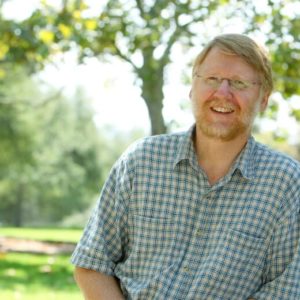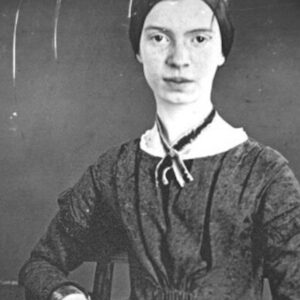We recently spoke with author Paul J. Willis about his new Slant book, Somewhere to Follow.
What are the poems about?
The book is divided into four sections: “Then,” “Now,” “Near,” and “Far.” The first section, “Then,” is composed of mostly narrative poems rooted in my growing-up years. They are tinged with my evangelical upbringing and the mountains of Oregon I came to love. The second section, “Now,” concerns the bafflements of my forty years as a college teacher. When you think about it, mine is a strange job. People pay real money to group up in classrooms and put their noses in books together. Sometimes, I just watch. The third section, “Near,” features lyric poems that have flourished in the chaparral behind Santa Barbara, where I have lived with my family for the last thirty-three years. And the fourth section, “Far,” is set mostly in the Sierra Nevada—which is not so very far away but which, to me, has always felt distant and exotic. John Muir called it the “Range of Light.” It still is.
Do you consider yourself a nature poet, then?
Part of me thinks, well, what else is there? It confuses me that nature writing should be considered as some sort of specialized niche. The earth is really our grand subject. But, like Wordsworth, I seem to be as interested in the quirky people I run across as I am in the natural places in which I find them. Just the fact that I tend to personify trees and flowers and ferns and frogs reminds me that the imagination is inescapably social.
So, Wordsworth is an important influence?
One of three. I like to call them the three Williams: Shakespeare, Wordsworth, and Stafford.
In graduate school I wrote my dissertation on the way in which Shakespeare uses forest settings in his plays—fully a third of them, by my count. Absolutely fascinating. He really was alive to the ways we are influenced by the green woods and dark woods of our cultural imagination. I also like Shakespeare because, even though he is quite profound, he is never afraid to be funny.
But though I deeply admired Shakespeare, it was Wordsworth who got me to write my own poems. Over thirty years ago, I read the entire Prelude on an eight-day solo hike in the San Rafael Wilderness. By the end of that walk, I felt a joyful sympathy with the way his imagination worked—and I knew that I would be trying to write a few good poems of my own.
Stafford I came to a little later, after hearing him read a time or two. I love him as a poet of conscience, for his unpretentious fearlessness. And for his gentle encouragement that poetry is something anyone can try. After his death I came to realize he had got his start as a poet just half an hour from my house in Santa Barbara—at a civilian public service camp in which he was placed as a conscientious objector during World War II. The site of that camp is now a lovely picnic area in Los Padres National Forest. For the last fifteen years, I have hosted an annual community reading of his work there—right where he developed his habit of writing every day before dawn.
Is that what you do too? Get up early to write your poems?
As a matter of fact, I pretty much do. As with all writing, however, I am fairly opportunistic. When time opens up, whether early or late in the day, I often obey that sometimes weak impulse to put pen to paper.
Not fingers to keys?
No, my poems go through many handwritten drafts before making it onto the computer. They feel a little more organic, a little more physical, that way. Besides, many of them are drafted outdoors. I’m hiking along, and suddenly something wants to be written about—a line pops into my head, say, or a hummingbird comes humming along.
Is this your best book of poetry yet?
How would I know? Sometimes I think I am getting better, year by year. Then, by accident, I run across an old poem of mine and can’t believe I wrote something that good. Of course, I also run across old poems and cringe at how talky, clichéd, and self-conscious they are. My earliest poems were filled with allusions to other poems I had read. I think I wanted to show off my reading (a nasty habit of younger writers), and I also didn’t have the guts to stand by my own words. Now I do, for better or worse. In general, though, I try to be kind to my former poems and former selves.
Back to that former self of yours, say a bit more about the family in which you grew up and the books you read when you were young.
I grew up in a houseful of books of a certain kind. My parents met at the Bible Institute of Los Angeles and were very active Sunday School teachers in our Baptist church, so there were many Bibles and Bible commentaries on our shelves, along with a plethora of popular devotional books. My father was a scientist with an interest in history, so there were books about biology and battles as well. My mother had some interest in keeping up with the kind of books discussed in Good Housekeeping, so she subscribed to the Reader’s Digest Condensed Book series.
I studied the Bible faithfully from a young age, though not so much the commentaries, and the devotional book that attracted my attention was a fairly ancient illustrated edition of The Pilgrim’s Progress, which I read many times. (I still think of the Muckraker, so busy pulling his rake through the mud that he doesn’t notice the shining crown being offered to him by two hands from above. He was just doing his job, I thought. This guy is getting a bad rap.) I took a turn or two through the Reader’s Digest Condensed Books but soon learned to distrust them, sensing that the authors had been robbed of their original voice.
Fortunately for me, my mother’s sister, who was a Baptist missionary in Japan, had been an English major at Berkeley and sent us books by C.S. Lewis. I read them all, starting with the Narnia books in grade school and ending with the space trilogy in junior high. These books opened a door for me to an intensely gratifying experience, one that was also intensely private. It was as if, should I talk about these reading experiences, they would disappear. When the fairies bring you gold, it is a secret you must keep.
And yet, your day job is to talk with college students about literature.
Yes, how ironic. In school, nothing bothered me more than intrusive questions about the content of my reading. They seemed so—superficial. In the eighth grade, I remember a teacher trying to engage me in class discussion about Shirley Jackson’s short story “The Lottery.” “These questions are stupid!” I burst out. I didn’t know how else to express it. Whatever that deep feeling was that a story or a poem gave me, these questions in school couldn’t touch it.
So, now that I am a teacher of literature myself, I make it a point of honor not to prime my students with questions before they read a work of literature. I want them to be able to engage each work on its own terms and their own terms, not be sent on some kind of literary scavenger hunt. After they have read a work, I have them write a completely open-ended journal response. I read these journal responses and make excerpts from them for the entire class to read. Only then do the questions begin. To this day, whenever I see “Questions for Discussion” at the end of an otherwise wonderful book, something in me shrivels and dies.





